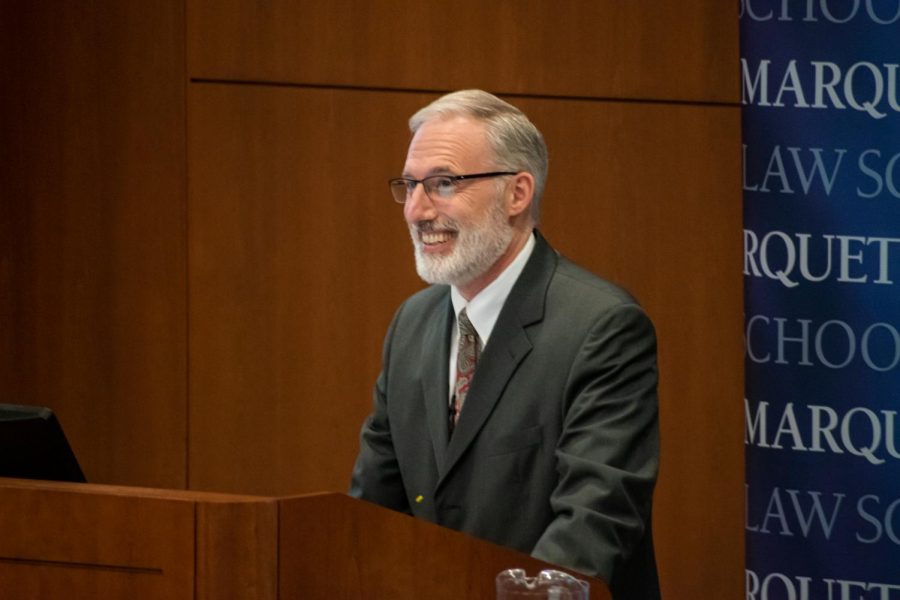Vice Chancellor of the Court of Chancery of the State of Delaware, J. Travis Laster spoke at the Marquette Law School’s Hallows Lecture in Eckstein Hall’s Lubar Center March 3. His presentation was titled “Corporate Responsibility: Is Delaware Doing Something New?”
The Hallows Lecture is held annually and honors E. Harold Hallows. Hallows was a Milwaukee lawyer and Marquette Law School faculty member from 1930 to 1958 and a justice of the Wisconsin Supreme Court from 1958 to 1974. He served as chief justice in his last six years.
Joseph Kearney, Dean of the Law School and a professor of law, said the law school has a series of distinguished lectures over the course of the year, two in the fall and two in the spring. He said the Hallows Lecture hosts a distinguished judge often but not always. The speaker, Kearney said, is someone who can explain, teach and challenge some area of law.
When choosing the judge who would present at the lecture, Kearney said he surveys the faculty rather informally any number of times and my area is public law, not commercial law and so the Delaware Court of Chancery is not a place I would have great familiarity or expertise.
However, he said one of his colleagues, who was associate dean at the time, went to law school with Vice Chancellor Laster and said he was a “remarkably sharp individual.” Kearney then spoke with his corporate law colleagues such as Nadelle Grossman, the Associate Dean for Academic Affairs and a Professor of Law at the Marquette Law School, who “warmly endorsed the idea of going with a corporate law person and thought Vice Chancellor Laster would be spot on.”
Kearney said he believed the lecture benefited the law students for two main reasons. The first being the “substantive value of learning about an area of law,” meaning there was importance in what was taught at the lecture. He said the corporate area of law that was taught was not the area of most of the faculty and most of the students just getting into the profession would not know much about. He also said it was a discussion of some cutting edge aspects of this area.
Kearney said the second benefit was that the lecture was an opportunity for various people involved in the profession to gather, including students, faculty, practicing lawyers and other judges. He said the event was an example to students that “in an era where politics are so polarized the legal profession is one that enjoys one another’s company and values getting together.”
Laster said that his title as Vice Chancellor of the Court of Chancery of Delaware means that he is a trial judge in a Delaware Court of Equity. This is a business court and one of Deleware’s three constitutional courts. Laster said the court primarily hears business related cases, but it also hears traditional equity matters such as guardianship, real estate and wills and trusts cases.
“I can guarantee you it’s the business side of the docket that caused me to be invited out here,” Laster said.
Laster said the basic idea of his presentation was how “Delaware law has evolved in terms of the human accountability of corporate actors.” He said over the past twenty years, there have been three landmark court decisions the most recent being a decision involving Blue Bell Ice Cream, which came out last year. Laster said the main focus of his talk was to “discuss the differences in those regimes and what Blue Bell may or may not need.”
Patience Drake Roggensack, the Chief Justice of the Wisconsin Supreme Court, was one of the attendees of the lecture. She said she attended because she thinks there’s always very interesting speakers at the Hallows Lecture and she likes the topic of corporate law, a field she was involved in as a practician before becoming a judge. Roggensack said she thought the lecture was “wonderfully interesting” and she wasn’t disappointed.
Roggensack said that during the lecture she was very interested in how Laster portrayed Delaware law because some of the things he talked about are not the way a Wisconsin court would handle cases. However, she did find that some of the principles were the same.
Roggensack added that she believes the lecture benefitted law students because the students were able to gain knowledge about security law including a derivative action, which is when there’s an injury to the corporation and shareholders decide to sue on behalf of the corporation. She said she thinks corporate law is very interesting and it is beneficial for law students to learn about.
Laster talked about how he believed he benefitted all the attendees at the event.
“We as humans tend to always be looking toward the next thing and we forget that each moment in life always comes once and we need things to reawaken us constantly to that fact,” Laster said.
He said he was sure everyone came to the lecture to hear a speech about law, but “it’s far more important that people think about how each moment is distinct and needs to be treasured.”
This story was written by Matthew Choate. He can be reached at [email protected].

